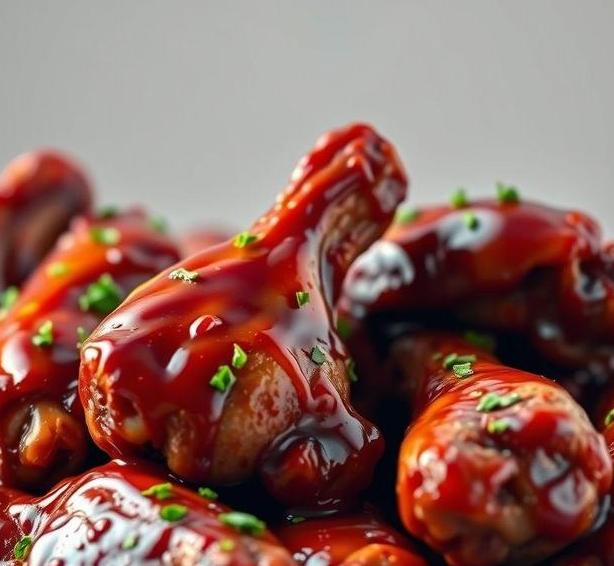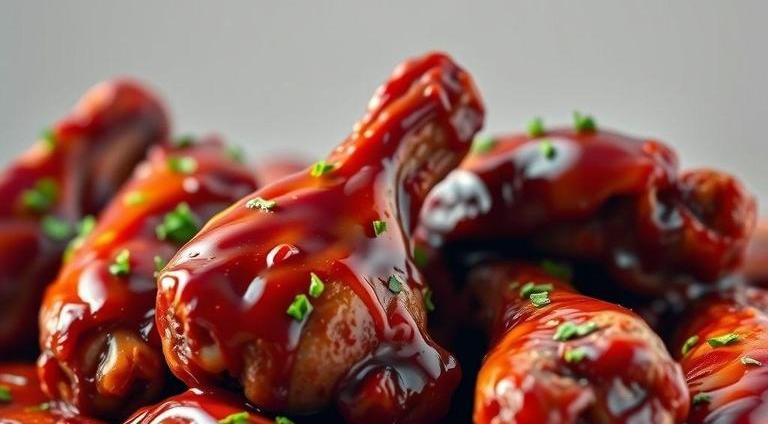Chicken wings are a beloved dish for many-whether you’re enjoying them at a casual BBQ, during game day, or at a trendy restaurant. They’re crispy, flavorful, and satisfying, making them a perfect comfort food. But what happens when you’ve got leftovers or you’ve bought a large batch to store for later? Like any perishable food, chicken wings are subject to spoilage if not stored correctly. It’s important to know the shelf life of chicken wings, how to tell when they’ve gone bad, and how to properly store them to make sure they stay as fresh as possible. This guide will walk you through all of that and more.
Can Chicken Wings Go Bad?
Yes, chicken wings can absolutely go bad! In fact, all meat, including poultry like chicken, is highly perishable. When it’s not stored properly or left out for too long, it can develop harmful bacteria, mold, and a foul smell, which makes it unsafe to eat. The risk of foodborne illnesses, like Salmonella or Campylobacter, increases when the chicken wings are left at room temperature for extended periods or aren’t stored in a fridge or freezer soon enough.
So, the short answer is: chicken wings can go bad, just like any other meat. It’s crucial to understand how to store them properly to maintain their safety and taste.
Shelf Life For Chicken Wings

Understanding how long chicken wings last depends on a few factors, including how they’re cooked, stored, and whether they’re fresh or frozen. Here’s a breakdown of how long chicken wings last under different circumstances:
-
Raw Chicken Wings (Refrigerated)
Raw chicken wings, if stored properly in the fridge, can last 1-2 days. They must be kept at a temperature of 40°F (4°C) or lower. After this period, the risk of bacterial growth increases dramatically.
-
Cooked Chicken Wings (Refrigerated)
Once cooked, chicken wings can be safely stored in the refrigerator for about 3-4 days. The meat needs to be cooled quickly and stored in an airtight container to avoid contamination and preserve freshness.
-
Chicken Wings (Frozen)
When stored in the freezer, both raw and cooked chicken wings can last much longer:
- Raw wings: Can be frozen for 9-12 months without significant loss of quality.
- Cooked wings: Freezing cooked wings is also a good option and can preserve them for about 4-6 months.
Freezing helps extend their shelf life, but it’s important to note that their texture may change after thawing, especially if they were not properly sealed before freezing.
Common Signs Of Spoilage
Knowing when your chicken wings have gone bad is crucial for preventing foodborne illness. Here are some common signs to look out for:
-
Smell
Spoiled chicken wings will have a sour or off-putting odor. Fresh cooked wings should smell savory, and raw wings might have a slight poultry smell, but anything pungent or sour means the meat is no longer safe to eat.
-
Color
Fresh chicken wings are typically pale with a slight pinkish hue. If they turn gray, green, or have any discolored patches, it’s a strong sign they’ve spoiled. This can happen to both raw and cooked wings.
-
Texture
Spoiled chicken wings will feel slimy or sticky to the touch. If the surface feels tacky or slimy, discard them immediately. Fresh wings should have a firm texture.
-
Mold
While mold on raw or cooked wings is not as common, it’s possible if they’ve been stored too long or improperly. If you see mold spots on any part of the chicken, it’s time to toss them out.
-
Taste
If you’re still unsure whether your chicken wings have gone bad, the taste test can be the last resort (though not recommended). Spoiled wings will have a sour or off flavor that is hard to ignore. If it tastes off, don’t risk it-throw them away.
How To Store Chicken Wings?
Proper storage is the key to keeping your chicken wings fresh and safe to eat. Here are some helpful tips on how to store them:
Refrigeration

-
For Raw Chicken Wings
- Store raw wings in their original packaging or in an airtight container. This helps prevent contamination from other foods in the fridge.
- Keep raw chicken on the bottom shelf of the refrigerator to avoid cross-contamination with other foods.
-
For Cooked Chicken Wings
- Place cooked wings in an airtight container or wrap them tightly with plastic wrap or aluminum foil. The goal is to minimize exposure to air to keep the wings fresh.
- Always let cooked wings cool to room temperature before storing them in the fridge to prevent condensation, which can lead to bacterial growth.
Freezing
-
For Raw Chicken Wings
- If you plan to freeze raw wings, it’s a good idea to use freezer-safe bags or containers. You can also vacuum-seal them to prevent freezer burn.
- Be sure to label the packaging with the date so you can keep track of how long they’ve been frozen.
-
For Cooked Chicken Wings
- If freezing cooked wings, use an airtight container or a zip-top bag. Try to remove as much air as possible to prevent freezer burn and loss of texture. It’s helpful to reheat the wings straight from the freezer to maintain crispness.
- If you want to keep your wings crispy when reheating, it’s a good idea to wrap them in foil and reheat in the oven, not the microwave, to preserve their texture.
Proper Cooling
- For both raw and cooked chicken wings, it’s crucial to cool the wings before storing them. Never leave them at room temperature for more than 2 hours (1 hour if the temperature is above 90°F or 32°C). This is a prime window for bacterial growth.
Expert Tips
-
Use Your Nose
If you’re not sure whether chicken wings are still good, always use your sense of smell. If they smell off or sour, it’s best to toss them. Never rely on sight alone to check for spoilage, as some bacteria are invisible.
-
Don’t Overcrowd
When storing chicken wings in the fridge or freezer, avoid overstuffing containers. This can prevent proper air circulation and lead to uneven cooling or freezing, which can speed up spoilage.
-
Avoid Refreezing
If chicken wings were thawed in the fridge and you didn’t cook them, avoid refreezing them. The texture and flavor will degrade, and bacteria might begin to multiply once the meat has thawed.
-
Marinate With Care
If you’ve marinated your chicken wings, store them in the fridge immediately. Marinating them at room temperature can lead to bacterial growth. Always discard any leftover marinade that has come into contact with raw chicken.
FAQs
Can Chicken Wings Go Bad If Left Out?
Yes, chicken wings can go bad if left out at room temperature for more than two hours. Bacteria can grow rapidly on cooked chicken at temperatures between 40°F (4°C) and 140°F (60°C), making them unsafe to eat.
How Long Can Cooked Chicken Wings Last In The Fridge?
Cooked chicken wings can last in the fridge for 3 to 4 days when stored properly in an airtight container. After this time, the risk of bacterial growth increases.
Can You Eat Chicken Wings After 5 Days In The Fridge?
It’s generally not recommended to eat chicken wings after 5 days in the fridge. They may still be safe if stored properly, but the taste and quality will deteriorate, and the risk of foodborne illness increases.
How Can You Tell If Chicken Wings Have Gone Bad?
Signs that chicken wings have gone bad include a sour or off smell, a slimy texture, and discoloration. If they appear or smell unusual, it’s safest to discard them.
Can Frozen Chicken Wings Go Bad?
Frozen chicken wings can last up to 6 months in the freezer when stored properly. However, they can still go bad if they are exposed to air or not stored in an airtight container, leading to freezer burn.
What Happens If You Eat Spoiled Chicken Wings?
Eating spoiled chicken wings can lead to food poisoning. Symptoms may include stomach cramps, nausea, vomiting, and diarrhea, caused by bacteria such as Salmonella or Campylobacter.
How Should You Store Cooked Chicken Wings To Make Them Last Longer?
To extend the shelf life of cooked chicken wings, store them in an airtight container or tightly wrapped in plastic wrap and foil. Keep them in the fridge for up to 4 days or freeze them for longer storage.
Can Chicken Wings Go Bad In The Freezer?
Yes, chicken wings can go bad in the freezer if they are not stored properly. While they can be frozen for up to 6 months, improper wrapping or exposure to air can cause freezer burn, affecting texture and taste.
Can You Tell If Chicken Wings Are Bad By Taste?
It’s not safe to rely on taste alone to determine if chicken wings have gone bad. Spoiled chicken can cause foodborne illness even if the taste seems normal. It’s best to check for visual and olfactory signs of spoilage.
How Long Can You Keep Raw Chicken Wings In The Fridge?
Raw chicken wings should be used within 1 to 2 days of purchase if stored in the fridge at 40°F (4°C). If not cooked by that time, it’s best to freeze them to maintain safety and quality.